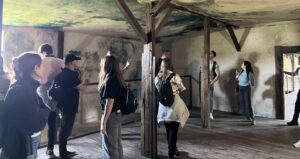All of the biblical feasts are prophetic; rich with symbolism and laden with spiritual nourishment for both Jews and Gentiles. They speak of who God is, our journey with Him and his plans for the future. The Spring feasts speak of the Messiah’s coming: Passover is a foreshadow of Calvary, Firstfruits of the resurrection, and Shavuot (the Feast of Weeks) is a forerunner to the outpouring of the Spirit at Pentecost. The Fall Feasts symbolize the last trumpet that will sound as the Messiah returns, Yom Kippur points to the final judgement, and Sukkot is the final feast where God and man can at last move in together, like a newly-wed couple who have been longing for complete union.
The meaning of the Sukkah / Tabernacle
The sukkah (which means tabernacle or booth, sukkot is the plural) reminds us of the wandering in the desert as God led Israel from slavery to the Promised Land.
You are to live in sukkot for seven days. All the native-born in Israel are to live in sukkot, so that your generations may know that I had Bnei-Yisrael to dwell in sukkot when I brought them out of the land of Egypt. I am Adonai your God. (Leviticus 23:42-43)
God’s point about making these makeshift homes for a week is to help the children of Israel remember this particular part of their journey with him. The desert times were intense and temporary, but a very special time of forging the relationship between God and his people.
Following the covenant they made at Sinai when they agreed to follow Him, Israel was then escorted by God to the place He had prepared for them. In fact, God refers to it as a honeymoon period:
I remember the devotion of your youth,
your love as a bride,
and the way you followed Me in the wilderness,
in a land not sown. (Jeremiah 2:2)
Many times throughout scripture, God paints a picture of Himself as a husband and His people as His bride, often lamenting Israel’s unfaithfulness, as in the book of Hosea. It is a deliberate metaphor that God often uses to communicate His passionate love, the seriousness of his devotion and commitment, and the way he wants us to see Him.
The tent of meeting in the desert similarly provided a prototype of the reality of God’s holy temple in heaven. These things are shadows, types, and are temporary and passing away. But they speak of the tremendous and permanent reality to come. Several times throughout scripture God offers a dwelling place and a covering. A shelter and a canopy. He brings us to His banqueting table and His banner over us is love.
The meaning of the Chuppah / Wedding canopy
The word chuppah means covering or protection, and acts as a symbolic roof, covering the couple who are getting married. It is where the legal business of betrothal takes place, and symbolizes the home of the groom, into which the bride is welcomed. In a Jewish wedding ceremony, the bride and groom stand under the chuppah, as a symbol of the bridegroom’s permanent and real home, and the bride in Song of Songs talks about being invited into her love’s chambers. Like a sukkah, it’s a temporary shelter symbolizing a home, where there is great rejoicing and intimate fellowship.
In Jewish weddings, rejoicing is taken very seriously! So too with the Feast of Sukkot. It is the only feast in which we are actually commanded to rejoice!
“You are to keep the Feast of Sukkot for seven days, after gathering in the produce from your threshing floor and winepress.” So you will rejoice in your feast—you, your son and daughter, slave and maid, Levite and outsider, orphan and widow within your gates. Seven days you will feast to Adonai your God in the place He chooses, because Adonai your God will bless you in all your produce and in all the work of your hand, and you will be completely filled with joy. (Deuteronomy 16:14-16)
The link between the joyous feasting in the sukkah at the Festival of Tabernacles and the joy under a wedding chuppah is noted by the rabbis (Tractate Sukkah 25b), which releases wedding parties from the obligation of rejoicing in sukkot during the feast:
“What is the reason? Because they have to rejoice… There is no proper rejoicing but under the wedding canopy… There can be no real rejoicing except where the banquet is held.”
Similarly, the cloud that protected the Israelites by day during their desert years has also been likened to this canopy:
“With the cloud of a chuppah and the shadow of a sukkah, Israel will commune with their God.”1
A wedding equals maximum rejoicing in rabbinic thinking. But the connection between the joyful times in the sukkah and the unbridled joy of the chuppah is a link that makes perfect sense. This is what Sukkot is all pointing towards. This is our joy – the ultimate wedding feast of the Lamb of God and his spotless bride.
A wedding invitation
Yeshua speaks of the ultimate wedding at the end of time in Matthew 22, and John’s Revelation pulling back the curtain on the best and most joyous wedding feast humanity has ever known:
“Behold, the dwelling of God is among men,
and He shall tabernacle among them.
They shall be His people,
and God Himself shall be among them
and be their God.
He shall wipe away every tear from their eyes,
and death shall be no more.
Nor shall there be mourning or crying or pain any longer,
for the former things have passed away.” (Revelation 21:3-4)
As human beings, we can’t boast about anything that we intend to do in the future, since we have no idea what will end up happening, but God can say with absolute certainty what will be. All of His feasts are called moedim in the Bible – the word moed meaning appointed time, something that is destined to happen. In fact, the tent of meeting in Hebrew is called “ohel hamoed’, the tent of destined or appointed meeting! This is God’s purpose, and this is our destiny – to dwell together in perfect union with Him in the place He has prepared for us. This is the wonderful meaning of the Feast of Tabernacles: a small preview of the last page in God’s magnificent story of redemption.
- Mordechai Breuer, Isaiah chapters in Tvunot (Ed: Yosef Ofer) p.159
















